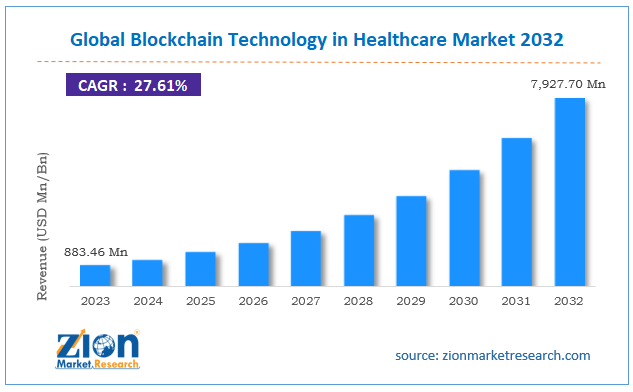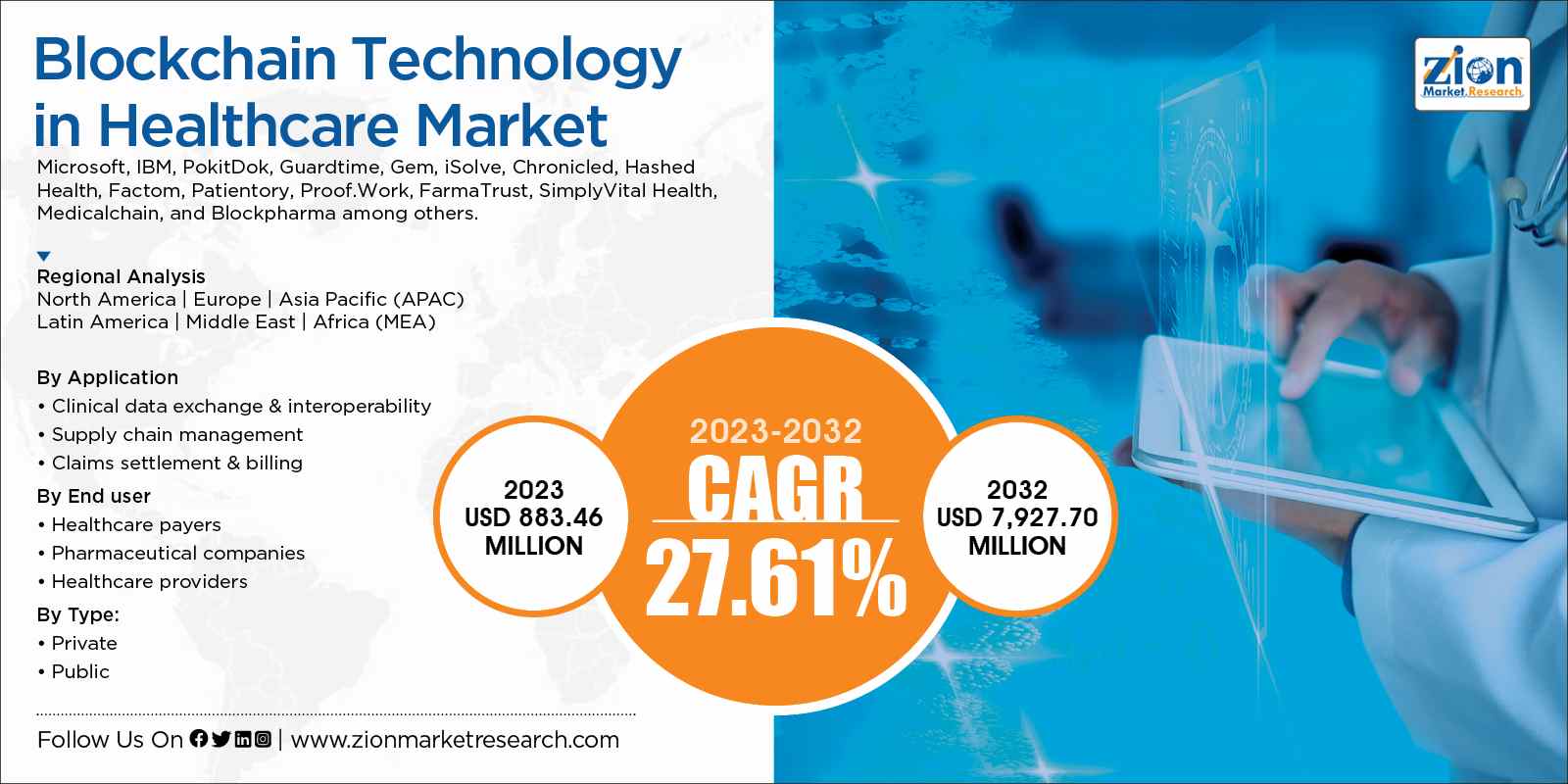Blockchain Technology in Healthcare Market Size, Share, Trends, Growth and Forecast 2032

Blockchain Technology in Healthcare Market By Application (clinical data exchange & interoperability, supply chain management, and claims settlement & billing), By End user (healthcare payers, pharmaceutical companies, and healthcare providers), And By Region - Global And Regional Industry Overview, Market Intelligence, Comprehensive Analysis, Historical Data, And Forecasts 2024 - 2032
| Market Size in 2023 | Market Forecast in 2032 | CAGR (in %) | Base Year |
|---|---|---|---|
| USD 883.46 Million | USD 7,927.70 Million | 27.61% | 2023 |
Blockchain Technology in Healthcare Market: Overview
The global Blockchain Technology in Healthcare Market size was worth around USD 883.46 Million in 2023 and is predicted to grow to around USD 7,927.70 Million by 2032 with a compound annual growth rate (CAGR) of roughly 27.61% between 2023 and 2030.
Key Insights
- As per the analysis shared by our research analyst, the blockchain technology in healthcare market is anticipated to grow at a CAGR of 27.61% during the forecast period.
- The global blockchain technology in healthcare market was estimated to be worth approximately USD 883.46 million in 2023 and is projected to reach a value of USD 7,927.70 million by 2032.
- The growth of the blockchain technology in healthcare market is being driven by increasing need for secure, transparent, and interoperable data management across hospitals, pharmaceutical companies, insurers, and research organizations.
- Based on the application, the clinical data exchange & interoperability segment is growing at a high rate and is projected to dominate the market.
- On the basis of end user, the healthcare payers segment is projected to swipe the largest market share.
- In terms of type, the private segment is expected to dominate the market.
- By region, North America is expected to dominate the global market during the forecast period.
Blockchain is a decentralized system where one can store your data and maintain it across a peer-to-peer network of computer systems called nodes. It is a form of a public digital ledger that is very much similar to spreadsheets. Blockchain is a powerful technology that secures data and keeps it confidential. Blockchain is widely utilized in the healthcare system to keep the patient record confidential and accessible anywhere and any part of the world. The implementation of blockchain technology in the healthcare sector further saves on huge costs along with time. The adoption of blockchain has truly revolutionized the healthcare and pharmaceutical segment by streamlining its operations. The blockchain functions in healthcare can be divided into five primary areas namely, protecting healthcare data, managing electronic records, personal health data records, electronic health records, and point-of-care genome management.
The increasing incidence of information leaks and data breaches, coupled with the rising requirement to curb these issues, are attributed to the market growth. Strategic initiatives by the key players, high demand to reduce drug counterfeiting, and the need for efficient health data management systems are the major factors leading to the adoption of the technology.
Global Blockchain Technology in Healthcare Market: Growth Factors
The growing cases of information leak and data breach issues are some of the major factors driving the growth of the global blockchain technology in healthcare market. Moreover, the strategic initiatives adopted by key players to curb these issues along with surging cases of drug counterfeiting are further complementing the growth. The growing transformation in healthcare infrastructure is posing a huge need for an efficient healthcare data management system, which in turn is fueling the adoption of blockchain in the healthcare sector. The growing investments from prominent market leaders for the development of wearable devices, cryptography, efficient healthcare data maintenance system, and medical examination system is likely to create many lucrative growth opportunities in the global market during the forecast period.
Additionally, the increasing prevalence of many life-threatening diseases is further boosting the demand for data management in the healthcare sector. Also, the growing initiatives from the government to leverage the healthcare facilities to patients involve the adoption of blockchain technology to ensure data integrity. Several startups are stepping into the market to bridge the gap between the healthcare sector and blockchain technology by offering intelligent healthcare solutions to address the underlying challenges efficiently, hence such factors are further likely to escalate the growth of the global blockchain technology in healthcare market in the forthcoming years.
Blockchain technology in healthcare can transform the way data is processed in the healthcare industry. As the number of patients keeps rising, the data volume will keep growing. Hospitals and clinics will find it difficult to store and process such high volumes of information. By creating a blockchain, healthcare providers will be able to add and access patient data with relative ease. Different types of medical data that include insurance claims, patient health information (PHI), electronic health records (EHR), and data collected from monitoring systems can be accessed by both healthcare providers and covered entities. By using blockchain technology in healthcare, the information can be secured and verified.
Aspects like increasing cases of medical data breach, growing number of fraudulent drugs and medicines, rising investment in blockchain technology startups working in healthcare sector will push the growth of global blockchain technology in healthcare market. Other factors like the growing adoption of blockchain as a service (BaaS) solutions and government initiatives in implementing blockchain technology in healthcare are expected to drive the market growth. The growing use of Internet of Things (IoT) in healthcare will act as a major opportunity for the companies working in the blockchain technology in healthcare market. However, factors like absence of pivotal entity and universal standards, paucity of awareness, and knowledge of blockchain technology will restrain the growth of blockchain technology in healthcare market.
Blockchain Technology in Healthcare Market: Report Scope
| Report Attributes | Report Details |
|---|---|
| Report Name | Blockchain Technology in Healthcare Market Size Report |
| Market Size in 2023 | USD 883.46 Million |
| Market Forecast in 2032 | USD 7,927.70 Million |
| Growth Rate | CAGR of 27.61% |
| Number of Pages | 188 |
| Forecast Units | Value (USD Billion), and Volume (Units) |
| Key Companies Covered | Microsoft, IBM, PokitDok, Guardtime, Gem, iSolve, Chronicled, Hashed Health, Factom, Patientory, Proof.Work, FarmaTrust, SimplyVital Health, Medicalchain, and Blockpharma among others. |
| Segments Covered | By Application, By End user And By region. |
| Base Year | 2023 |
| Historical Year | 2018 to 2022 |
| Forecast Year | 2024 - 2032 |
| Customization Scope | Avail customized purchase options to meet your exact research needs. Request For Customization |
Global Blockchain Technology in Healthcare Market: Segmentation
The global blockchain technology in healthcare market can be segmented into end-user, application, type, and region.
By end-user, the market can be segmented into drugs & medical device companies, insurance providers, hospitals, and others. The drug & medical device companies segment accounts for the largest share in the global blockchain technology in healthcare market due to the growing adoption of technology for vital functions including verification authenticity of exchange drugs, checking compliance with pharmaceutical supply chain, counterfeit prevention, traceability in clinical trials, and several others.
By application, the market can be segmented into clinical trials & e-consenting, supply chain management, claims adjudication & billing, clinical data exchange & interoperability, and other applications. The supply chain segment holds the largest share in the global blockchain technology in healthcare market as blockchain applications offer data integrity. The technology also assists in facilitating interoperability with the internet of things devices.
By type, the market can be segmented into private and public.
Global Blockchain Technology in Healthcare Market: Regional analysis
Europe accounts for the largest share in the global blockchain technology in healthcare market due to the growing initiatives from the government to prevent data breach cases. Also, the growing investments from prominent market leaders to introduce innovative solutions in the healthcare sector for data management will further accentuate the growth of the regional market.
North America is likely to foresee a significant growth rate in the forthcoming years due to the growing demand for data safety in the healthcare sector.
Global Blockchain Technology in Healthcare Market: Competitive Players
Some of the significant players in the global blockchain technology in healthcare market are -
- American Addiction Centers
- Springstone
- Haven Behavioral Healthcare
- Behavioral Health Group
- Aurora Behavioral Health System
- CRC Health
- Psychiatric Solutions
- Magellan Health
- Universal Health Services
- Acadia Healthcare
- Promises Behavioral Health.
By Application:
- Clinical data exchange & interoperability
- Supply chain management
- Claims settlement & billing
By End user:
- Healthcare payers
- Pharmaceutical companies
- Healthcare providers
By Type:
- Private
- Public
Blockchain Technology in Healthcare Market: Regional Segment Analysis
- North America
- The U.S.
- Canada
- Europe
- France
- The UK
- Spain
- Germany
- Italy
- Rest of Europe
- Asia Pacific
- China
- Japan
- India
- South Korea
- Southeast Asia
- Rest of Asia Pacific
- Latin America
- Brazil
- Mexico
- Rest of Latin America
- Middle East & Africa
- GCC
- South Africa
- Rest of Middle East & Africa
What Reports Provides
- Full in-depth analysis of the parent market
- Important changes in market dynamics
- Segmentation details of the market
- Former, on-going, and projected market analysis in terms of volume and value
- Assessment of niche industry developments
- Market share analysis
- Key strategies of major players
- Emerging segments and regional markets
- Testimonials to companies in order to fortify their foothold in the market.
Table Of Content
Methodology
FrequentlyAsked Questions
RelatedNews
HappyClients
Zion Market Research
Tel: +1 (302) 444-0166
USA/Canada Toll Free No.+1 (855) 465-4651
3rd Floor,
Mrunal Paradise, Opp Maharaja Hotel,
Pimple Gurav, Pune 411061,
Maharashtra, India
Phone No +91 7768 006 007, +91 7768 006 008
US OFFICE NO +1 (302) 444-0166
US/CAN TOLL FREE +1 (855) 465-4651
Email: sales@zionmarketresearch.com
We have secured system to process your transaction.
Our support available to help you 24 hours a day, five days a week.
Monday - Friday: 9AM - 6PM
Saturday - Sunday: Closed






